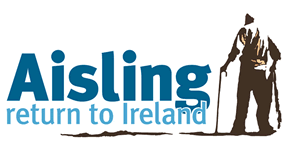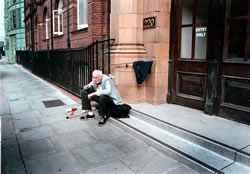Alex McDonnell and Aisling colleagues pay our respects to an old friend and reflects on modern cultural practices now adopted and adapted in the time of Covid-19. (pic: on the steps of Arlington House).
Michael Hogan was buried recently at the Islington Crematorium in East Finchley. Michael died a few months ago at the beginning of the Corona virus alert but he turned out not to have had the virus. He was in University College hospital for a long time and died there. Things are a bit mixed up these for everyone and sadly no one from Michael’s family was able to make it over and he had no family members in the UK. It was down to Aisling and Michael’s housing association Sapphire (formerly Irish Centre Housing) to make sure that his cremation was witnessed.
It was an early start, the first cremation at 9.15 and Charlie, Mary and I made our separate ways to the massive public burial site near the North Circular Road. When we got there we were told that the first cremation begins at 9.30am so we were a little earlier than we needed to be (little did we know exactly how early at the time). Mary was driving but because of social distancing Charlie and I were on foot so we set off early from the gate around 9am to get to the crematorium deep in the heart of the cemetery. It was a beautiful and fascinating walk through the ancient gothic grounds with centuries old grave-stones and mausoleums everywhere overgrown with trees and plants, nature taking it’s course.
We met the Catholic priest at the chapel who welcomed us in Irish and discussed the arrangements. The three of us were the only ones to have turned up at that stage and the officials had to press on as they were fully booked with cremations every 45 minutes and the same for burials at the other chapel on the site. The priest did not know Michael so we told him a few things, that he was from Limerick, that he loved sports etc. The coffin was brought in to the chapel and the priest began the ceremony speaking movingly of Dominic: that he was from Limerick and loved sports etc. He then asked me to say a few words from my memories of Dominic, which I was prepared to do but saying first that I presumed that Dominic was how Michael was known on his birth certificate but his name was Hogan. No Dominic O’Keefe was the only name he had. Wrong man, wrong cremation. Michael’s was up next. Poor Dominic had no one to attend the service and so we remained and waited for Michael’s service at 10.15. We had a good laugh with the first priest and Charlie asked him if this had ever happened to him before and was his name Father Ted?
Megan and Janice from Sapphire Housing association where Michael had been living for the last number of years in his own flat, turned up for Michaels service and it was arranged that it would be live streamed which is the common practice now with social distancing the norm. I managed to get through the eulogy I had planned to speak for Michael and had begun to give for Dominic an hour earlier. I realized then that I had known Michael for many years. I met him first 1994 when I began working in Arlington House, the massive men’s hostel in Camden Town. Michael was one of 250 Irish men living in that house which was the biggest hostel in the world with 450 overall rooms. It was incredible to think that older Irish men made up so many of the then homeless population in London.
Michael was on of 9 siblings born in St. Mary’s Park in Limerick City. Three brothers and a sister died before Michael, leaving three brothers and one sister who gathered this morning to watch the live stream from their home in Limerick. Michael began his working life in Limerick as a cabinet maker but when he came to London he worked mostly as a barman in the many Irish pubs in the city, including, most memorably The Telegraph in Brixton. As we have said he was a great sports fan and was an amateur boxer in his youth and played for two soccer clubs in the city, Star Rovers and Island United. He was particularly fond of hurling and would often ring John Glynn on a Sunday or Monday for the hurling results.
John Glynn and I began the Aisling Project when I was working in Arlington and John was working in the London Irish Centre. It was becoming apparent that all of these men, like Michael were hiding away in London suffering from self-imposed isolation after a self-perceived lack of success as an emigrant. The burden that exile had placed on so many emigrants to make their fortunes led to a fear of returning home empty handed and in Michaels‘s case, sadly, a severe case of depression. The Aisling Project set out to reverse this trend and bring Irish men and women home to Ireland to make contact again with their families and friends and lift the heavy psychological burden from their backs. In the last 26 years we have organised over a hundred trips and have brought back over a thousand people. Micheal came with us on the third trip we organized to Louisburgh in Co Mayo. For the first two years we were nagging Michael until he relented to come, on the understanding that we would not be going to Limerick. The shame and pride being still too raw to make the final move all the way home.
When Michael got used to the idea he looked forward to the trips with Aisling and eventually he made it back to Limerick with Aisling. His brothers picking him up from Killaloe, Co. Clare where we were staying at that time. Sadly because of Michael’s depression he didn’t make it on a later trip when he had planned to stay with his family for the full week. We waited outside his door in our minibus on the way to Holyhead but he couldn’t even make it down stairs to the door at that time and his sister died a month later without seeing him again. Sad as that is at least Michael had many happy trips with Aisling and made the connection with his family before he died putting aside many years of disappointment and grief.
On the long way back through Finchley Cemetery to the front gate Charlie and I stopped at the memorial to Arlington House Irish residents many hundreds of whom are buried here in the great rambling necropolis and we spent a bit of time there remembering all the ones that we knew including now, Michael. I often heard the phrase from hard bitten, unsentimental men in Arlington, when things were looking bad, ‘Next stop Finchley’, meaning the cemetery of course.
Charlie then went off to do some shopping for some Irish women locked down on account of the virus and I went on down to Camden Town to pay my respects at the house of a woman from a well-known Camden Town Irish family. There I met many people I knew, some from Arlington House in the old days and hundreds of others lining the street to pay our respects as the hearse went by. Another new cultural development we have adopted in the wake of this deadly disease where only 6 or so can now attend a funeral service even if you do it twice.

